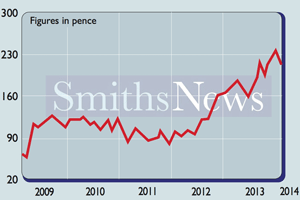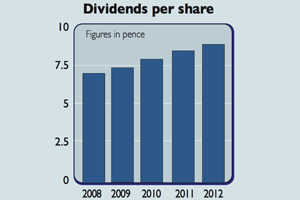Shares in focus: Defying the prophets of doom
Smiths News has proved itself a survivor in a dying industry. Should you buy the shares? Phil Oakley investigates.
Get the latest financial news, insights and expert analysis from our award-winning MoneyWeek team, to help you understand what really matters when it comes to your finances.
You are now subscribed
Your newsletter sign-up was successful
Want to add more newsletters?

Twice daily
MoneyWeek
Get the latest financial news, insights and expert analysis from our award-winning MoneyWeek team, to help you understand what really matters when it comes to your finances.

Four times a week
Look After My Bills
Sign up to our free money-saving newsletter, filled with the latest news and expert advice to help you find the best tips and deals for managing your bills. Start saving today!
Not many held out much hope for news distributor Smiths. They were wrong, says Phil Oakley.
Britain's largest distributor of newspapers and magazines has never been seen as a glamorous business to own. That said, Smiths News has treated its long-term shareholders well. When investing, dull can be good.
Since Smiths News was spun off from WH Smith in 2006, many have viewed the company as a boring firm in a declining industry.There's nothing exciting about charging around in the middle of the night making sure that supermarkets and newsagents get their newspapers and magazines at 6am.
MoneyWeek
Subscribe to MoneyWeek today and get your first six magazine issues absolutely FREE

Sign up to Money Morning
Don't miss the latest investment and personal finances news, market analysis, plus money-saving tips with our free twice-daily newsletter
Don't miss the latest investment and personal finances news, market analysis, plus money-saving tips with our free twice-daily newsletter
Profit margins are wafer thin, while newspaper circulation has been steadily declining for years and many magazine titles have folded.
Yet Smiths News has been able to keep increasing profits and dividends for shareholders. As the stock market has woken up to the fact that the business is not likely to die soon, investors have been willing to pay a higher price for Smiths News' shares. They have had a good run during the last year, which raises the question of whether now is the time to sell up, or if it's still worth staying on board.
How has the business fared?
Management knows that this market will keep on declining as people rely more heavily on the internet for information and newspapers and magazines are increasingly read on tablet devices and smartphones.
On the assumption that sales continue declining at a rate of 3%-5% per year, Smiths reckons that it can maintain the trading profits of its news distribution business at around £40m a year. It is taking out £20m of costs over three years by reducing its number of depots and creating more super-hubs big warehouses serving a higher number of clients.
Despite a declining market, Smiths News is very good at serving its customers. It has achieved this by investing heavily in IT and becoming more efficient. It also has a business that is very difficult to compete with, as contracts with publishers typically last five years and the costs of warehousing and transport deter new entrants.
In fact, Smiths may actually be able to win additional business from national and regional newspapers, helping it in its aim of maintaining profits.
A successful acquisitions strategy
These areas provided 29% of total company profits in 2013 and the aim is to raise their share to 50% by 2016. If Smiths News can do this then the stockmarket may be prepared to become more favourably disposed towards its shares again.
Bertrams, the book distribution business Smiths News bought in 2009, has had to deal with the growth of e-books and reduced funding for public libraries. But it has been offsetting this by winning more business with big internet booksellers such as Amazon and Tesco, and by expanding into foreign markets.
It has also set up a business called Wordery, which sells books directly to consumers, having previously been a successful marketplace seller on Amazon and Ebay. Bertrams has been doing well with its digital academic e-book business, and it looks like it can help Smiths grow its profits.
So too does The Consortium, a business Smiths News bought in 2012. The Consortium distributes stationery, art and crafts kits, furniture and cleaning products to schools, nurseries and care homes for the elderly. Budgets for schools are under pressure, but the situation is better for nurseries and care homes.
Smiths News believes that it is well placed to sell more of these supplies to existing customers as well as to win new custom, and is investing heavily on the internet to make buying these products easier. Over the long run, a growing and ageing population means that more of these items are likely to be ordered.
Should you buy the shares?
However, Smiths News is making good progress in doing so and has the financial strength to go out and buy more businesses, which it probably will.
In a nutshell, despite having gone up a lot, Smith News' shares could still be quite cheap. If profits don't grow very much from current levels, then it seems that the share price could still hold up reasonably well. On the other hand, if 50% of the company's profits ends up coming from better business in three years' time, then buying the shares today could be a good thing to do.
Verdict: buy for dividend growth
Smiths News (LSE: NWS)


Directors' shareholdings
Get the latest financial news, insights and expert analysis from our award-winning MoneyWeek team, to help you understand what really matters when it comes to your finances.
Phil spent 13 years as an investment analyst for both stockbroking and fund management companies.
-
 Should you buy an active ETF?
Should you buy an active ETF?ETFs are often mischaracterised as passive products, but they can be a convenient way to add active management to your portfolio
-
 Power up your pension before 5 April – easy ways to save before the tax year end
Power up your pension before 5 April – easy ways to save before the tax year endWith the end of the tax year looming, pension savers currently have a window to review and maximise what’s going into their retirement funds – we look at how